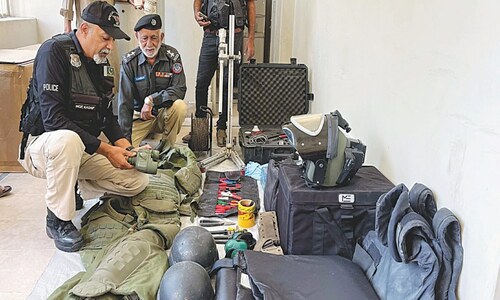KARACHI: The Sindh High Court on Monday declared that the Industrial Relations Act (IRA) 2012 that granted the industrial and commercial workers the right to form labour unions was a valid piece of legislation.
With this ruling, a three-judge bench headed by Justice Faisal Arab, disposed of 52 different but identical petitions filed by several labour unions, including the CBAs of the K-Electric and Sui Southern Gas Company.
The larger bench that included justices Muhammed Ali Mazhar and Salahuddin Panhwar ruled that the federal legislature was competent to enact EIRA 2012 which was the only forum for the workers to seek remedy with regard to industrial disputes arising in trans-provincial industrial and commercial establishments having branches in more than one province.
The larger SHC bench, headed by acting Chief Justice Faisal Arab, announced a 26-page verdict that was reserved for pronouncement in Septemer last.
The petitioners argued that the act impinged upon the provincial autonomy after the passage of the 18th Constitutional Amendment, adding that after the 18th amendment, labour was a provincial subject.
Their counsel said that in the post-18th amendment scenario, the IRA was ultra vires of the constitution as the subjects it covered (formation of trade unions and settlement of industrial disputes) fell within the legislative competence of the provincial legislature.
However, the counsel argued that the federal government in given circumstances was competent to legislate on matters such as formation of trade unions and settlement of industrial disputes relating to companies operating at the trans-provincial level. They added that the provincial assemblies were not empowered to make law having operation beyond their territories.
The deputy attorney general defended the enactment of the law stating that the IRA 2012 could not be struck down as it was within legislative competence of the federation on the basis of entries 14, 27 and 32 of Part-I of the Fourth Schedule and Entry 13 of Part-II of the Fourth Schedule of the Constitution. Entry 27 (interprovincial trade and commerce) on federal legislative list entitles the federation to come up with legislation such as the IRA 2012 aimed at regulating industrial disputes arising in establishments operating within the federal capital territory or at the trans- provincial level.
He said the act did not deal with companies that operated in a particular province, adding that such companies were regulated purely by the provincial law.
In the verdict, the court noted that after the 18th constitutional amendment, there was no law permitting workers fundamental right of freedom of association at the trans-provincial level nor was the provincial legislature competent enough to enact law for the purpose. As per Article 141 of the constitution, the provincial assembles are not empowered to make laws having operation beyond their jurisdiction.
It ruled: “Unless there is legislation at federal level, the rights of workmen to have trade union activities in trans-provincial establishments could not be materialised. Hence there was this urgent need to have a legal forum at federal level to facilitate exercise of fundamental right under 17 Article of the constitution for industrial and commercial establishments that operate in Islamabad and at trans- provincial level.
The judges observed that the IRA 2012 in its application did not destroy or usurp the provincial autonomy or the principles on which the federation was formed under the constitution, adding that it only facilitated and regulated the right to form trade unions at the trans-provincial level, as that right could not be attained through laws enacted by the provincial legislature.
The judges wrote in the verdict: “It is the IRA only which enables the exercise of the fundamental right of trade union as guaranteed under Article 17 of the constitution. In our view when a right to form a political party at national level is available and allowed to be exercised throughout the country, so does the right to form associations and unions at level transcends territorial boundaries of the province”.
The court ruled that all cases pending adjudication in labour courts pertaining to trans- provincial industrial and commercial establishments shall stand transferred to the labour courts of appropriate jurisdiction. Likewise, the cases pending in the National Industrial Relations Court pertaining to inter-provincial industrial and commercial disputes shall be transferred to the labour courts of appropriate jurisdictions.
The petitioners were represented by over 38 lawyers, including advocates Rashid A. Razvi, Makhdoom Ali Khan, Salahuddin Ahmed, S. Shoa-un-Nabi, Malik Naeem Iqbal, Zial-ul-Haq Makhdoom, Mehmood Adul Ghani and Moin Azhar Siddiqui.
Published in Dawn, August 5th, 2014















































Dear visitor, the comments section is undergoing an overhaul and will return soon.